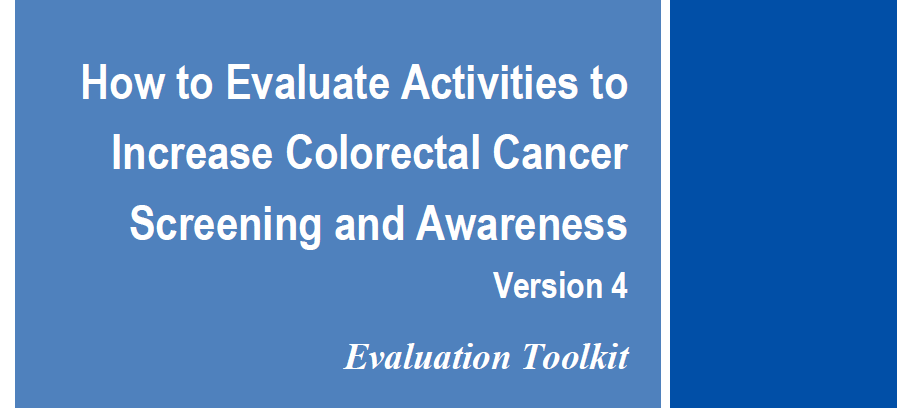Evaluation Toolkit: How to Evaluate Activities to Increase CRC Screening and Awareness

Now With Case Studies That Include Policy and Systems Change!
“The 7-step process is helpful. It is a guide/outline that can be used to ensure that you have developed a great program and the ability to evaluate the effectiveness of your program.”
This latest version of the evaluation toolkit is intended to help organizations and communities evaluate a wide variety of interventions designed to increase awareness and use of colorectal cancer screening. The toolkit will help you learn the seven basic steps to evaluation, whether you are working to increase community demand for colorectal cancer screening, encouraging health care providers to recommend screenings, or trying to implement policy, systems, or environmental (PSE) changes. This toolkit will provide you with:
- A basic understanding of evaluation strategies.
- Tools that you can use and adapt to assess baseline screening rates, or the effectiveness or impact of the intervention.
- Basic skills to collect outcome data to inform and improve decision-making.
- Tips for incorporating evaluation results into grant proposals, reports, and other dissemination activities.
- Practical yet comprehensive evaluation references and resources.
Supplemental resources for the Evaluation Toolkit are below:
- Evaluation Tip Sheets – designed to give you a quick overview of the evaluation process.
- Guidance on Evaluation 80% by 2018 Messaging
- Evaluation Toolkit Webinar
Explore More

Increasing Colorectal Cancer Screening in Rural Communities: A Practical Guide
This guidebook is designed to support key community partners in understanding and overcoming the unique challenges and common barriers to CRC screening faced in rural communities.

American Cancer Society: A Colorectal Cancer Screening Guide for Cancer Coalitions
This new guide from the American Cancer Society will help build your coalition's capacity to address colorectal cancer screening.

Clinician’s Reference: Stool-Based Tests for Colorectal Cancer Screening
This revised resource is designed to introduce (or reintroduce) clinicians to the value of stool-based testing for colorectal cancer.